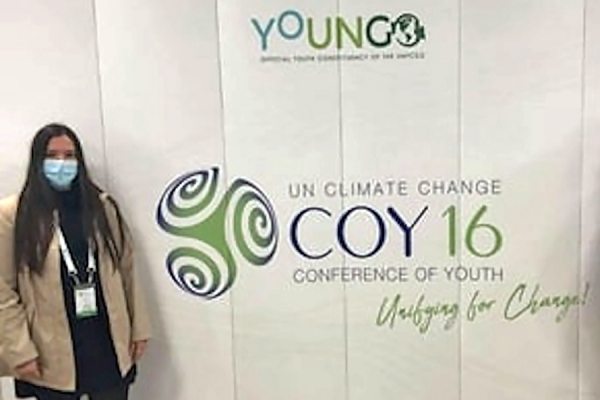 Environmental studies major Maddie Peters represented Canada at the United Nations Climate Change Conference of Youth.
Environmental studies major Maddie Peters represented Canada at the United Nations Climate Change Conference of Youth.
A UWindsor science student joined the fight against climate change at the United Nations Climate Change Conference of Youth (COY16) in Glasgow in October. COY16 preceded the United Nations Climate Change Conference of Parties (COP26).
Maddie Peters is a fourth-year environmental studies student with the School of Environment. Over the course of four days she participated in plenary sessions, breakout sessions, skill building workshops, and networking activities.
“We provided input about our countries’ positions in the climate crisis and this was all recorded and formulated into the Global Youth Statement,” she says. “This policy document was created to represent youth voices which was then presented at COP26 and distributed to world leaders and negotiators.”
Peters says bringing together youth from all over the world to create this policy document in person and virtually was an effective way to represent the youth perspective because very few young people are invited to be involved in COP26 negotiations.
“Youth are the most important stakeholder in these climate negotiations because we will be living with the consequences of inaction for the rest of our lives,” says Peters.
“We are too often left out of the discussion and this conference is a way to amplify youth voices.”
As the only Canadian representative from the Great Lakes region, Peters felt it was important to raise the region’s unique challenges at the COY16 discussions.
“Last year we saw extremely high lake levels that caused a lot of damage to our shorelines and unfortunately it is likely that this will become more and more common in the future,” she says.
“Southwestern Ontario is also one of the most productive agricultural regions in Canada and our climate is projected to become ‘wetter and wilder’ which poses a serious threat to farmers.”
Peters says the main highlight for her was getting to meet youth from around the world and listen to their stories.
“I particularly enjoyed hearing from Jiboiana, a group of indigenous environmental activists who spoke about the struggles that Brazilian indigenous tribes are facing to protect the Amazon rainforest.”
In 2020 Peters was chosen as a panelist for the Essex Climate Adaption Team where she assisted the Municipality of Essex to create their climate adaption plan along with several other members of the community. She currently works for the resource conservation department at Point Pelee National Park.
